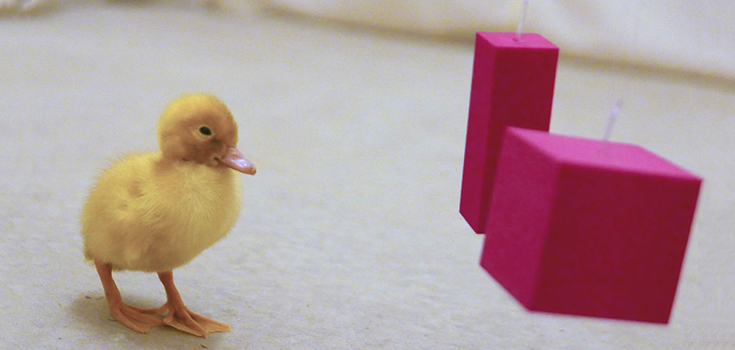Study: Ducks May Be Able to Think in an Abstract Manner
Study: Ducks May Be Able to Think in an Abstract Manner
A new study finds that ducks can actually think in an abstract manner at less than 24 hours old.
A new study finds that ducks can actually think in an abstract manner at less than 24 hours old. It seems that they can learn objects, the differences between objects, imprint on them, and their relationships to one another.
In the past, researchers thought that animals, especially ducks, could only grasp these concepts after a significant amount of training. However, this new study has blown that completely out of the water, showing that even newly-hatched ducklings can tell the difference between objects and their relationships to one another within 30 minutes.Scientists from the University of Oxford were inspired by the idea that ducklings are able to recognize their mother and begin to follow her around within the first few minutes of their lives. They wanted to deduce whether this was simple visual memory or was perhaps indicative of more complex memory imprinting.
The experiment involved placing newly-hatched ducklings in an enclosure where two objects were placed on a string. All of the objects were red, and either the same (as in two squares or two pyramids) or different (such as a square and a sphere).
After a while, the ducks began to imprint on them and follow them around. After a thirty-minute break, the ducks were placed in a new enclosure where they were shown two more objects on a string, that were either two of the same objects or two different objects.
The researchers found that 68 percent of the ducklings followed around the same objects they had learned in their training enclosure . For example, if they had followed around two of the same objects in the enclosure, they did the same thing when faced with the other objects.
A second experiment was done with color, and the ducklings almost always chose to follow around the objects that matched the colors that were presented in the imprinting phase .
Antone Martinho, a doctoral student at the University of Oxford and a lead author on the study said:
“We often think of things like ability to form abstract thoughts as one of the things that makes humans special. That’s not necessarily untrue, but the presence or absence of abstract thought is probably not what makes humans special.”
“The ability to identify and retain logical relations between stimuli and apply them to novel stimuli is known as relational concept learning. This has been demonstrated in a few animal species after extensive reinforcement training, and it reveals the brain’s ability to deal with abstract properties.
Here we describe relational concept learning in newborn ducklings without reinforced training. Newly hatched domesticated mallards that were briefly exposed to a pair of objects that were either the same or different in shape or color later preferred to follow pairs of new objects exhibiting the imprinted relation.
Thus, even in a seemingly rigid and very rapid form of learning such as filial imprinting, the brain operates with abstract conceptual reasoning, a faculty often assumed to be reserved to highly intelligent organisms.”
| About Anna Scanlon: | |
| Anna Scanlon is an author of YA and historical fiction and a PhD student at the University of Leicester where she is finishing her degree in modern history. You can find out more about Anna and her books on her lifestyle blog annainwonderland.co.uk. | |
Other Popular Stories:
There are no related stories quite yet.

Post a Comment